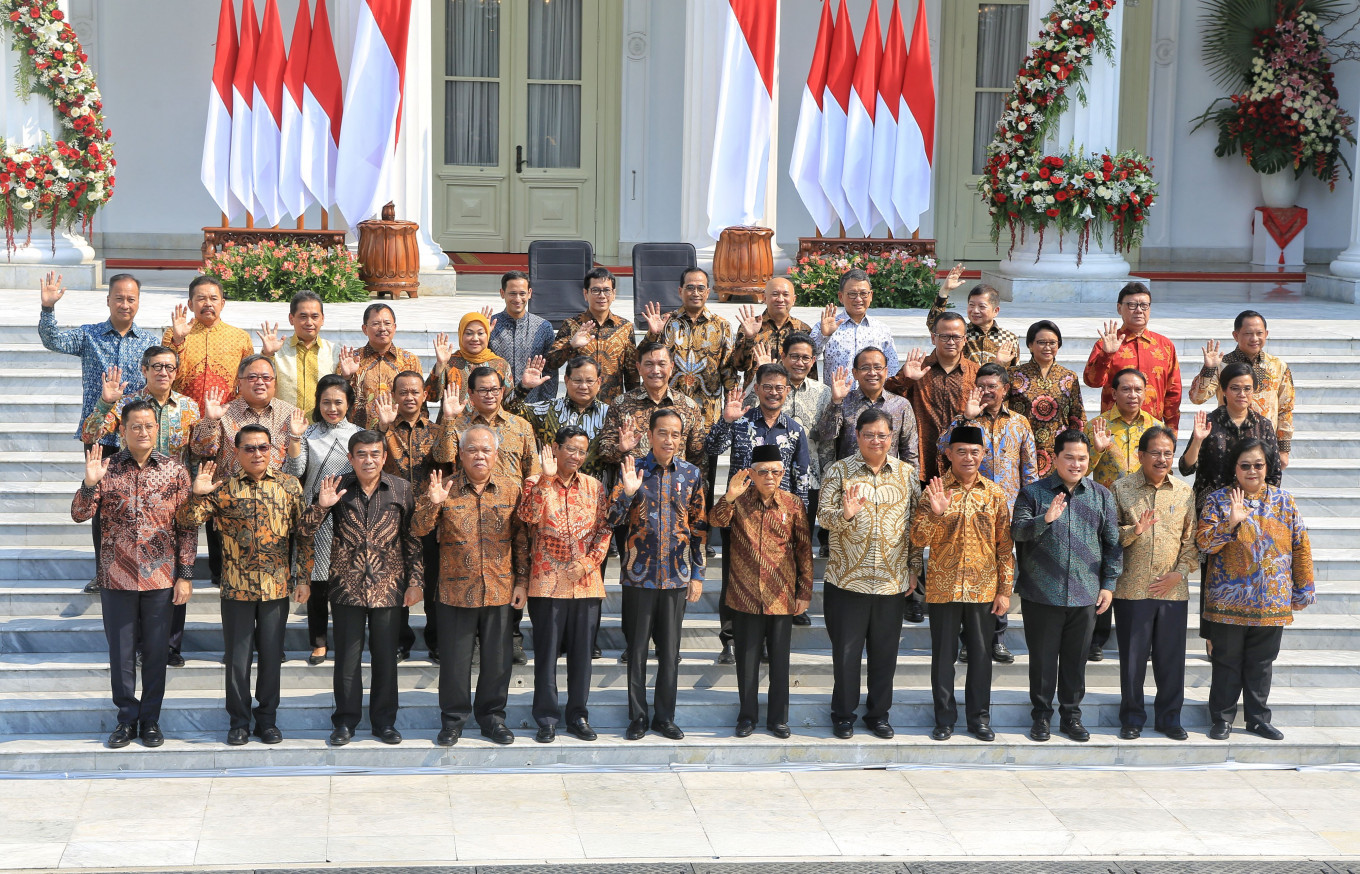Subscripe to be the first to know about our updates!

Indonesia Inc.: Economic team in the hands of CEO Jokowi
Esther Samboh
Like a CEO addressing his employees, President Joko “Jokowi” Widodo uttered the directives during his inauguration speech and when he introduced the Cabinet members for his second term.
If Jokowi was the CEO of a private company, he’d be adopting the David Allen productivity wisdom of “getting things done” and most probably be a micromanager. The appointment of Mahendra Siregar as deputy foreign minister is one example.
The former Indonesian ambassador to the United States came out of his interview with Jokowi carrying a document with very detailed and specific one-year targets and a Key Performance Index. Jokowi instructed Mahendra, who previously served as deputy trade minister and deputy finance minister, to reinvigorate economic diplomacy at the Foreign Affairs Ministry. His targets? Increase trade with the US from US$10 billion to $25 billion within two to five years and exceed palm oil exports value of $25 billion with $10 billion in foreign exchange savings.
In order to achieve this, Mahendra has been told to negotiate trade facilities with the US, push forward palm oil sustainability in the industry and revive bilateral trade discussions.
The former boss of the Investment Coordinating Board (BKPM) will directly report to Jokowi and if he fails to meet the target within one year, the President will replace him, the document shows.
From management literature, we learn that the characteristics of a micromanager include immersing themselves in the work assigned to others, looking at the detail rather than the big picture, being involved in the details and discouraging others from making decisions.
Mahendra is one of the 12 deputy ministers appointed by Jokowi, most of whom deal with the economy. While the number indicates a big consolidation of power in the eyes of political analysts, it also shows Jokowi’s clear intention to fix things on the economic front.
Indonesia’s economic growth has been dragged down by extremely weak exports in light of the ongoing US-China trade war and recession facing Europe’s biggest economies, while Brexit uncertainties add to geopolitical risks in global economic growth. Investment has also stagnated with weakening global demand.
The World Trade Organization (WTO) even slashed its global trade growth projection dramatically to 1.2 percent this year from previously 2.6 percent, while the World Bank and International Monetary Fund (IMF) lowered their global growth outlook.
The external conditions are therefore unfavorable for Jokowi in his second term. Against the backdrop of these risks, it is understandable that Jokowi appointed plenty of people to handle economic-related issues. With most of the 12 deputy ministers, plus the 15 ministers under the coordinating economic minister and coordinating maritime affairs and investment minister, the common thread is to boost investment and trade.
The macroeconomics front looks promising. With Sri Mulyani Indrawati reappointed as finance minister, fiscal and monetary policies, with Bank Indonesia helmed by Governor Perry Warjiyo, would continue to be strong.
But there lies the issue for other economic team members: coordination.
Looking at Jokowi’s brief for Mahendra and deputy trade minister Jerry Sambuaga, there are already plenty of top-line overlaps to begin with: international trade, trade deals, trade negotiations. While international trade negotiation and foreign trade fall under the Trade Ministry’s directorate generals, Mahendra is tasked with similar.
Put yourself in the shoes of the foreign counterpart – say the US Trade Representative on tariff negotiations or European Commission on palm oil – who should you be in contact with? This should call for fluid coordination especially between the two institutions on the international trade front.
Appearing to have factored in these potential coordination mishaps and overlaps, Jokowi appointed strong figures in the coordinating minister roles. Retired army general Luhut Binsar leads ministers dealing with energy and mining, maritime and fisheries, tourism, transportation and the BKPM head as coordinating maritime affairs and investment minister.
Discussions are already underway, led by Luhut, one of Jokowi’s most trusted allies since his first term, who will also coordinate Jokowi’s tourism and transportation vision. In the first few days, Luhut was quick to show that coordination is strong under his watch.
Luhut backed a gentlemen’s agreement between BKPM chairman Bahlil Lahadalia and nickel miners to bring forward the ore export ban from the Jan. 1, 2020 deadline, although the Energy Mineral Resources Ministry, which is the rightful authority to handle such policy, has yet to issue any regulation.
Coordinating Economics Minister Airlangga Hartato has criticized the move. The news may spook business players, who have for years called for structural and bureaucratic reforms to boost investment, but Luhut was quick to jump to his team member’s defense.
For Airlangga, using the state budget to address inequality and economic growth as well as revive the manufacturing industry and create jobs is central to his coordination role. But although the Golkar Party chairman is broadly considered a good fit for a coordinating role, his time as industry minister did not show much in terms of spurring the role of the manufacturing industry in Indonesia’s economy. His previous stint primarily focused on introducing the Industry 4.0 platform to the business world, which remains vague to this day with a low automation rate compared with neighboring countries.
The big question remains: Are these strong coordinating ministers enough to handle overlapping tasks? It may take more than a generation to solve deeply rooted issues such as bureaucratic red tape and policy flip-flops within the Indonesian government, which have created an unfriendly environment for investment.
source: thejakartapost